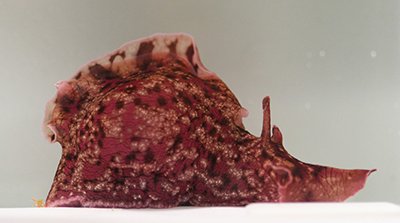National Aplysia Resource
National Aplysia Resource
Grant Number: P40OD010952
Research Emphasis/Objectives
The National Aplysia Resource provides investigators with laboratory-reared California sea hares, Aplysia californica, of known age and standardized environmental background at all stages of development, from eggs to mature adults. The Resource also provides marine algae to feed animals.
The Resource has two main goals. The first is to optimize and standardize Aplysia used by NIH investigators. This has been achieved with studies to optimize larval rearing and diet at all life stages, as well as with an extensive health monitoring program. The second main goal is to expand the uses of the Aplysia model system. Past research done by Resource scientists has focused on the potential use of Aplysia as a model for aging, the impacts of exercise or caloric restriction on learning throughout the life span, and Aplysia as a model for Alzheimer’s disease.
Aplysia is also an important educational tool. The Resource regularly provides animals for use in hands-on neurobiology laboratories, offered at levels from high school through graduate school, and also participates in community outreach activities that focus on local K–12 students from underrepresented groups in science. Furthermore, the Resource hosts several tours per month for local school groups and community organizations.
Current Research
Current research done at the Resource focuses on investigating the behavioral, neurophysiological, physiological, and transcriptomic changes associated with cerebral and myocardial ischemia/reperfusion injuries, which occur after ischemic strokes and heart attacks, respectively. Ischemia occurs in response to a reduction in oxygen (hypoxia) and glucose and an increase in metabolic waste products due to reduced blood flow to the tissue. Reperfusion is the return of blood flow, which can have counterintuitive negative impacts, such as an increase in reactive oxygen species and oxidative stress. The Resource will also investigate aging as a risk factor to surviving ischemia/reperfusion injury and potential treatments that can reduce effects. Along these lines, ongoing studies are investigating the impacts of hypoxia pre-exposure on hypoxia tolerance and whether tolerance has a genetic or epigenetic component. These findings will inform future studies with respect to ischemia/reperfusion injury and further development of this novel use for Aplysia.
Services Provided
Animals
Sibling cohorts of A. californica of known ages, developmental stages, and parentage are available to investigators. Aplysia and its food (red algae and Ulva) are shipped via FedEx overnight priority. Special cohorts (including aged animals), procedures, or manipulations of animal groups can be arranged by contacting the Resource.
The colony currently contains more than 10,000 laboratory-reared animals at various life stages. Animals are produced from either field-collected or laboratory-reared broodstock, monitored for health, and randomly tested for behavioral responses prior to shipping.
Facility staff will also provide advice on setting up marine aquarium facilities for short-term holding of Aplysia shipped from the Resource.
Guest Investigators and Graduate Students
Guest investigators and graduate students interested in studies of life history, culture, genetics, and neurophysiology are encouraged to inquire about conducting studies at the Resource. Selection will be based on the relevance of the proposed study and the availability of space and facilities to meet individual needs.
Contact Information
National Aplysia Resource
Rosenstiel School of Marine, Atmospheric, and Earth Science
University of Miami
4600 Rickenbacker Causeway
Miami, FL 33149
Principal Investigator
Michael C. Schmale, Ph.D.
Email: [email protected]
Scientific Director
Danielle McDonald, Ph.D.
Email: [email protected]
Resource Manager
Claudia Alvarez
Phone: 305-421-4941
Email: [email protected]



